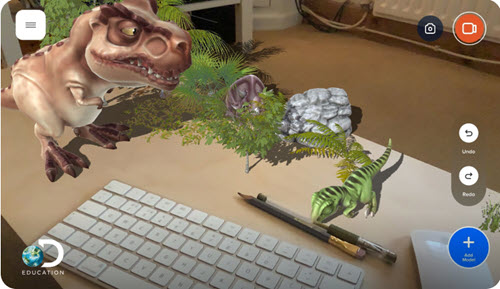Silver Spring, MD (Tuesday, August 2, 2022) – Discovery Education—the worldwide edtech leader whose state-of-the-art digital platform supports learning wherever it takes place—recently earned the Spaces4Learning New Product Award in the K-12 Remote Learning Technology category for its Sandbox AR app. The Spaces4Learning New Product Award program honors the outstanding product development achievements of companies whose products or services are particularly noteworthy for their ability to enhance the learning environment. Spaces4Learning is a leading publication for companies and organizations interested in creating high-quality facilities in both K-12 and higher education.
Discovery Education’s Sandbox AR app empowers students and teachers to create, share, and even inhabit virtual environments. Within Sandbox AR, users can create virtual worlds and populate them with some of the hundreds of unique objects from history, the built world, science and nature, and more. Sandbox AR also gives students new ways to express themselves and demonstrate their learning through a feature that lets learners take photos or record a video walkthrough with their own voice over. Sandbox AR even offers a mode that allows users to scale up and inhabit their own life size virtual environments.
For those new to AR, Sandbox AR includes many pre-built sandboxes exploring diverse subjects such as ancient Egypt, space exploration, Mayan civilization, road construction, and more, with additional sandboxes coming soon. Discovery Education is also making available several free, pre-built lessons educators can use with the app to familiarize themselves with integrating AR into classroom instruction. Sandbox AR is available for download here.
“Since its inception, Discovery Education has been an early mover in bringing innovative technologies—such as streaming video and digital textbooks—into the classroom, and we are now excited to put the power of augmented reality into the hands of educators with the Sandbox AR app,” said Scott Kinney, Chief Executive Officer at Discovery Education. “We are honored by this recognition as it validates our work to provide all educators state-of-the-art resources that connect students to the world around them. Thank you to the Spaces4Learning team for this recognition.”
The winners are determined by a panel of judges. Learn more about the New Product Awards and the 2022 winners here.
For more information about Discovery Education’s award-winning digital resources and professional learning services, visit www.discoveryeducation.com, and stay connected with Discovery Education on social media through Twitter and LinkedIn.
About Discovery Education
Discovery Education is the worldwide edtech leader whose state-of-the-art digital platform supports learning wherever it takes place. Through its award-winning multimedia content, instructional supports, and innovative classroom tools, Discovery Education helps educators deliver equitable learning experiences engaging all students and supporting higher academic achievement on a global scale. Discovery Education serves approximately 4.5 million educators and 45 million students worldwide, and its resources are accessed in over 100 countries and territories. Inspired by the global media company Discovery, Inc., Discovery Education partners with districts, states, and trusted organizations to empower teachers with leading edtech solutions that support the success of all learners. Explore the future of education at www.discoveryeducation.com.
- Iowa Department of Education Selects EPS Learning to Offer Elementary Schools Free Access to AI-Powered Literacy Solution - August 30, 2024
- The state of AI: Who is leading AI adoption? - August 30, 2024
- Literacy First Expands its Early Childhood Literacy Program to Chattanooga, TN After Successful Pilot Program - August 29, 2024


